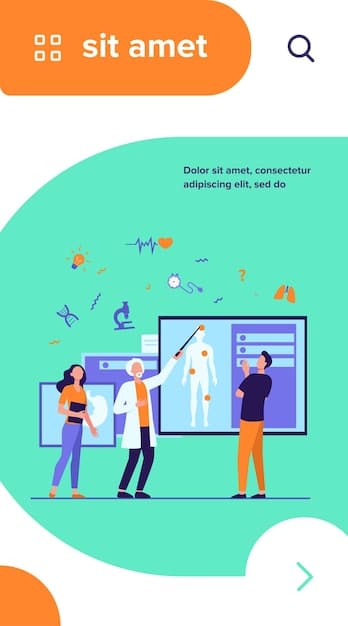AI in Healthcare: Transforming US Medical Practices

Artificial intelligence (AI) is revolutionizing healthcare in the United States, enhancing diagnostics, treatment, and patient care through advanced technologies.
The integration of artificial intelligence in healthcare: How is AI transforming US medical practices? is rapidly changing how medical professionals diagnose, treat, and manage patient care in the United States. This technological shift promises to enhance efficiency, improve accuracy, and personalize treatment plans, leading to better outcomes for patients and healthcare providers alike.
The Rise of AI in US Healthcare
Artificial intelligence is no longer a futuristic concept but a present-day reality in US healthcare. Its applications are vast and varied, ranging from automating administrative tasks to assisting in complex surgical procedures. The potential of AI to transform healthcare is immense, promising to revolutionize how care is delivered and experienced.
The adoption of AI in healthcare is driven by the need to address several challenges, including rising healthcare costs, increasing patient volumes, and the complexity of modern medicine. AI offers solutions to streamline processes, reduce errors, and improve the overall quality of care.

Benefits of AI in Healthcare
AI brings a multitude of benefits to the healthcare sector, enhancing various aspects of medical practice and patient care. These benefits include increased efficiency, improved diagnostic accuracy, personalized treatment plans, and reduced healthcare costs.
- Enhanced Diagnostics: AI algorithms can analyze medical images, such as X-rays and MRIs, with greater speed and accuracy than human radiologists, leading to earlier and more accurate diagnoses.
- Personalized Treatment: AI can analyze patient data to create tailored treatment plans, taking into account individual genetic factors, lifestyle, and medical history.
- Reduced Costs: By automating tasks and optimizing workflows, AI can help reduce administrative overhead and improve resource allocation, leading to significant cost savings.
- Improved Patient Outcomes: AI-driven tools can help healthcare providers make more informed decisions, leading to better treatment outcomes and improved patient satisfaction.
AI is not intended to replace healthcare professionals, but rather to augment their capabilities and assist them in delivering the best possible care. By automating routine tasks and providing data-driven insights, AI frees up clinicians to focus on the more complex and critical aspects of patient care.
AI in Diagnostics: Revolutionizing Accuracy
One of the most promising applications of AI in healthcare is in the field of diagnostics. AI algorithms can analyze vast amounts of medical data, including images, lab results, and patient histories, to identify patterns and anomalies that might be missed by human clinicians.
AI-powered diagnostic tools are being used to detect diseases earlier and more accurately, leading to improved treatment outcomes and reduced mortality rates. These tools can assist in diagnosing a wide range of conditions, from cancer to cardiovascular disease.
AI-Powered Medical Imaging Analysis
Medical imaging analysis is a critical component of modern healthcare, enabling clinicians to visualize and assess internal organs, tissues, and structures. AI is transforming this field by providing tools that can automatically analyze images and highlight areas of concern.
AI algorithms can detect subtle anomalies in medical images that may be indicative of disease. This can lead to earlier detection and intervention, improving the chances of successful treatment.
- Faster Analysis: AI can analyze medical images much faster than human radiologists, reducing the time it takes to make a diagnosis.
- Improved Accuracy: AI algorithms are trained on vast datasets of medical images, enabling them to detect subtle patterns and anomalies with greater accuracy.
- Reduced Errors: By automating the analysis process, AI can help reduce the risk of human error.
AI-powered medical imaging analysis is making it possible to diagnose diseases earlier and more accurately, leading to improved patient outcomes and reduced healthcare costs. As AI technology continues to advance, its role in diagnostics will only become more significant.
AI in Personalized Medicine: Tailoring Treatments
Personalized medicine, also known as precision medicine, is an approach to healthcare that tailors treatment plans to individual patients based on their unique genetic, environmental, and lifestyle factors. AI is a key enabler of personalized medicine, providing the tools to analyze complex patient data and identify the most effective treatment strategies.
AI algorithms can analyze a patient’s genetic profile, medical history, and lifestyle factors to predict how they will respond to different treatments. This information can be used to select the most appropriate medications, dosages, and therapies, maximizing the chances of success while minimizing the risk of adverse effects.

AI-Driven Drug Discovery and Development
Developing new drugs is a costly and time-consuming process, often taking years of research and development before a new medication is approved for use. AI is accelerating this process by providing tools that can analyze vast amounts of data and identify promising drug candidates.
AI algorithms can analyze molecular structures, biological pathways, and clinical trial data to predict the efficacy and safety of new drugs. This can help researchers prioritize the most promising candidates and avoid wasting resources on drugs that are unlikely to succeed.
- Faster Identification of Drug Candidates: AI can analyze vast datasets to identify potential drug targets and predict the efficacy of new compounds.
- Reduced Development Costs: By prioritizing the most promising drug candidates, AI can help reduce the costs associated with drug development.
- Improved Clinical Trial Design: AI can analyze patient data to identify subgroups that are most likely to respond to a particular drug, improving the design of clinical trials.
AI is transforming the drug discovery and development process, making it faster, more efficient, and more likely to result in effective new treatments. This has the potential to revolutionize healthcare, providing patients with access to more personalized and targeted therapies.
AI in Robotic Surgery: Enhancing Precision
Robotic surgery is a minimally invasive surgical technique that uses robotic systems to assist surgeons in performing complex procedures. AI is enhancing robotic surgery by providing tools that can improve precision, reduce errors, and enhance the surgeon’s control over the robotic instruments.
AI algorithms can analyze real-time data from the surgical field to provide surgeons with enhanced visualization and guidance. This can help them navigate complex anatomical structures and perform delicate maneuvers with greater accuracy.
Benefits of AI-Enhanced Robotic Surgery
AI-enhanced robotic surgery offers several benefits compared to traditional surgical techniques, including reduced blood loss, shorter hospital stays, and faster recovery times.
The use of AI in robotic surgery can lead to fewer complications and improved patient outcomes. As AI technology continues to advance, its role in robotic surgery will only become more significant.
- Enhanced Precision: AI algorithms can help surgeons perform more precise movements, reducing the risk of damage to surrounding tissues.
- Improved Visualization: AI can provide surgeons with enhanced visualization of the surgical field, making it easier to navigate complex anatomical structures.
- Reduced Fatigue: By automating some of the tasks involved in surgery, AI can help reduce surgeon fatigue, leading to fewer errors.
AI-enhanced robotic surgery is transforming the field of surgery, making it possible to perform complex procedures with greater precision, safety, and efficiency. This has the potential to improve patient outcomes and reduce healthcare costs.
Challenges and Ethical Considerations
While the potential benefits of AI in healthcare are immense, there are also several challenges and ethical considerations that need to be addressed. These include data privacy, algorithm bias, and the potential displacement of healthcare workers.
It is essential to ensure that AI systems are developed and used in a way that is ethical, transparent, and accountable. This requires careful consideration of the potential risks and benefits, as well as the development of appropriate regulations and guidelines.
Addressing Data Privacy Concerns
AI systems rely on vast amounts of data to learn and improve. This data often includes sensitive patient information, raising concerns about privacy and security. It is essential to implement robust data security measures to protect patient data from unauthorized access and misuse.
Healthcare providers need to be transparent with patients about how their data is being used and obtain their informed consent before using AI systems to analyze their medical information.
- Data Encryption: Encrypting patient data can help protect it from unauthorized access.
- Access Controls: Implementing strict access controls can limit who has access to patient data.
- Anonymization: Anonymizing patient data can help protect patient privacy while still allowing researchers to use the data for AI development.
Addressing data privacy concerns is crucial for building trust in AI systems and ensuring their responsible use in healthcare. By implementing appropriate safeguards and being transparent with patients, healthcare providers can harness the power of AI while protecting patient privacy.
The Future of AI in Healthcare
The future of AI in healthcare is bright, with the potential to transform virtually every aspect of medical practice. As AI technology continues to advance, we can expect to see even more innovative applications emerge, leading to improved patient outcomes, reduced healthcare costs, and a more efficient and effective healthcare system.
AI is poised to play an increasingly important role in healthcare, assisting clinicians in making more informed decisions, personalizing treatment plans, and automating routine tasks. This will free up healthcare professionals to focus on the more complex and critical aspects of patient care, leading to better outcomes for patients and healthcare providers alike.
Conclusion
| Key Point | Brief Description |
|---|---|
| 🩺 AI Diagnostics | Enhances accuracy and speed of disease detection through data analysis. |
| 🧬 Personalized Medicine | Tailors treatments to individual patient profiles using genetic and medical data. |
| 🤖 Robotic Surgery | Improves surgical precision and reduces recovery times with AI-guided robots. |
| 🔒 Data Privacy | Ensuring secure and ethical use of patient data in AI applications. |
FAQ
▼
AI algorithms analyze medical images like X-rays and MRIs to detect diseases faster and more accurately than human radiologists. This leads to earlier and more effective treatment.
▼
Personalized medicine tailors treatments based on individual genetic, lifestyle, and medical history, maximizing treatment effectiveness while minimizing potential side effects for patients.
▼
AI improves surgical precision and control, enhancing the surgeon’s ability to navigate complex areas, leading to reduced blood loss, shorter hospital stays, and faster recovery times.
▼
Ethical considerations include protecting data privacy and ensuring unbiased algorithms. Transparency and accountability are crucial to build trust in AI systems used for patient care.
▼
AI reduces costs by automating administrative tasks, improving resource allocation, and optimizing workflows. This results in significant savings and enhances the efficiency of healthcare delivery.
Conclusion
The integration of artificial intelligence in healthcare: How is AI transforming US medical practices? holds immense potential for revolutionizing the industry. From diagnostics and personalized medicine to robotic surgery and drug discovery, AI is poised to enhance efficiency, improve accuracy, and personalize treatment plans, ultimately leading to better outcomes for patients and healthcare providers in the United States. While challenges and ethical considerations remain, the future of AI in healthcare is bright, promising a more efficient, effective, and patient-centered healthcare system.





